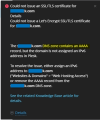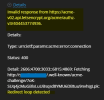LionKing
Regular Pleskian
- Server operating system version
- Ubuntu 22.04.4 LTS
- Plesk version and microupdate number
- Plesk Obsidian Version 18.0.62 Update #2
Hello.
I wonder if there is a way to get around this.Cloudflare's proxy function for each domain name block's for any automatic SSL certificate renewal and that means that when we have to update and renew our company's SSL certificates for plus 30 domain it takes oceans of times to do this because you have to manually disable each proxy function in each domain name's DNS record such as A, C-Name etc. It is a very time consuming and repetitive process as you can imagine.
We have tested with just setting each domain in "Developer mode" but that doesn't really make a difference.
So with that said: is there a way to get around this issue and actually get the automatic SSL renewal working on CloudFlare so you do not have to disable the proxy function each time the domains needs to be renewed?
Thanks in advance!
Kind regards
I wonder if there is a way to get around this.Cloudflare's proxy function for each domain name block's for any automatic SSL certificate renewal and that means that when we have to update and renew our company's SSL certificates for plus 30 domain it takes oceans of times to do this because you have to manually disable each proxy function in each domain name's DNS record such as A, C-Name etc. It is a very time consuming and repetitive process as you can imagine.
We have tested with just setting each domain in "Developer mode" but that doesn't really make a difference.
So with that said: is there a way to get around this issue and actually get the automatic SSL renewal working on CloudFlare so you do not have to disable the proxy function each time the domains needs to be renewed?
Thanks in advance!
Kind regards



